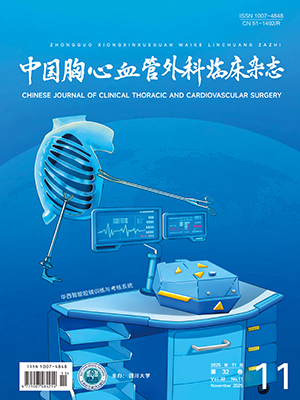| 1. |
Harky A, Harrington D, Nawaytou O, et al. COVID-19 and cardiac surgery: A perspective from United Kingdom. J Card Surg, 2021, 36(5): 1649-1658.
|
| 2. |
COVIDSurg Collaborative. Timing of surgery following SARS-CoV-2 infection: An international prospective cohort study. Anaesthesia, 2021, 76(6): 748-758.
|
| 3. |
中华人民共和国国家卫生健康委员会办公厅, 中华人民共和国国家中医药管理局综合司. 新型冠状病毒感染诊疗方案(试行第十版). 中国医药, 2023, 18(2): 161-166.
|
| 4. |
Faust JS, Du C, Liang C, et al. Excess mortality in Massachusetts during the delta and omicron waves of COVID-19. JAMA, 2022, 328(1): 74-76.
|
| 5. |
Kollias A, Kyriakoulis KG, Rapti V, et al. Prone positioning in patients with COVID-19: Analysis of multicenter registry data and meta-analysis of aggregate data. In Vivo, 2022, 36(1): 361-370.
|
| 6. |
Behesht Aeen F, Pakzad R, Goudarzi Rad M, et al. Effect of prone position on respiratory parameters, intubation and death rate in COVID-19 patients: Systematic review and meta-analysis. Sci Rep, 2021, 11(1): 14407.
|
| 7. |
Langford BJ, So M, Raybardhan S, et al. Bacterial co-infection and secondary infection in patients with COVID-19: A living rapid review and meta-analysis. Clin Microbiol Infect, 2020, 26(12): 1622-1629.
|
| 8. |
Mihalj M, Mosbahi S, Schmidli J, et al. Providing safe perioperative care in cardiac surgery during the COVID-19 pandemic. Best Pract Res Clin Anaesthesiol, 2021, 35(3): 321-332.
|
| 9. |
Bilaloglu S, Aphinyanaphongs Y, Jones S, et al. Thrombosis in hospitalized patients with COVID-19 in a New York City health system. JAMA, 2020, 324(8): 799-801.
|
| 10. |
Chen S, Zhang D, Zheng T, et al. DVT incidence and risk factors in critically ill patients with COVID-19. J Thromb Thrombolysis, 2021, 51(1): 33-39.
|
| 11. |
Rali P, O'Corragain O, Oresanya L, et al. Incidence of venous thromboembolism in coronavirus disease 2019: An experience from a single large academic center. J Vasc Surg Venous Lymphat Disord, 2021, 9(3): 585-591.
|
| 12. |
Osman F, Caplin N, Bashir M. COVID-19: The rising cost of cardiac surgery and disease. J Card Surg, 2021, 36(5): 1593-1596.
|
| 13. |
Deng JZ, Chan JS, Potter AL, et al. The risk of postoperative complications after major elective surgery in active or resolved COVID-19 in the United States. Ann Surg, 2022, 275(2): 242-246.
|
| 14. |
COVIDSurg Collaborative. Mortality and pulmonary complications in patients undergoing surgery with perioperative SARS-CoV-2 infection: An international cohort study. Lancet, 2020, 396(10243): 27-38.
|
| 15. |
Nguyen TC, Thourani VH, Nissen AP, et al. The effect of COVID-19 on adult cardiac surgery in the United States in 717 103 patients. Ann Thorac Surg, 2022, 113(3): 738-746.
|




